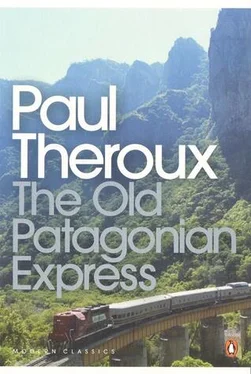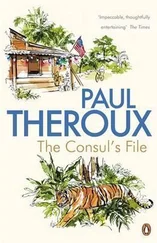Paul Theroux - The Old Patagonian Express - By Train Through the Americas
Здесь есть возможность читать онлайн «Paul Theroux - The Old Patagonian Express - By Train Through the Americas» весь текст электронной книги совершенно бесплатно (целиком полную версию без сокращений). В некоторых случаях можно слушать аудио, скачать через торрент в формате fb2 и присутствует краткое содержание. Год выпуска: 2008, Издательство: Penguin Books Ltd, Жанр: Путешествия и география, на английском языке. Описание произведения, (предисловие) а так же отзывы посетителей доступны на портале библиотеки ЛибКат.
- Название:The Old Patagonian Express: By Train Through the Americas
- Автор:
- Издательство:Penguin Books Ltd
- Жанр:
- Год:2008
- ISBN:нет данных
- Рейтинг книги:5 / 5. Голосов: 1
-
Избранное:Добавить в избранное
- Отзывы:
-
Ваша оценка:
- 100
- 1
- 2
- 3
- 4
- 5
The Old Patagonian Express: By Train Through the Americas: краткое содержание, описание и аннотация
Предлагаем к чтению аннотацию, описание, краткое содержание или предисловие (зависит от того, что написал сам автор книги «The Old Patagonian Express: By Train Through the Americas»). Если вы не нашли необходимую информацию о книге — напишите в комментариях, мы постараемся отыскать её.
The Old Patagonian Express: By Train Through the Americas — читать онлайн бесплатно полную книгу (весь текст) целиком
Ниже представлен текст книги, разбитый по страницам. Система сохранения места последней прочитанной страницы, позволяет с удобством читать онлайн бесплатно книгу «The Old Patagonian Express: By Train Through the Americas», без необходимости каждый раз заново искать на чём Вы остановились. Поставьте закладку, и сможете в любой момент перейти на страницу, на которой закончили чтение.
Интервал:
Закладка:
‘That's your Northumberland ancestry stirring.'
'Perhaps. The English are wonderful people. But timid. They didn't want an empire. It was forced upon them by the French and the Spanish. And so they had their empire. It was a great thing, eh? They left so much behind. Look what they gave India — Kipling! One of the greatest writers.'
I said that sometimes a Kipling story was only a plot, or an exercise in Irish dialect, or a howling gaffe, like the climax of 'At the End of the Passage', where a man photographs the bogeyman on a dead man's retina and then burns the pictures because they are so frightening. But how did the bogeyman get there?
'It doesn't matter — he's always good. My favourite is "The Church that was at Antioch." What a marvellous story that is. And what a great poet. I know you agree with me — I read your piece in the New York Times. What I want you to do is read me some of Kipling's poems. Come with me,' he said, getting to his feet and leading me to a bookshelf. 'On that shelf — you see all the Kipling books? Now on the left is the Collected Poems. It's a big book.'
He was conjuring with his hands as I ran my eye across the Elephant Head Edition of Kipling. I found the book and carried it back to the sofa.
Borges said, 'Read me "Harp Song of the Dane Women".'
I did as I was told.
What is a woman that you forsake her,
And the hearth-fire and the home-acre,
To go with the old grey Widow-maker?
' "The old grey Widow-maker," ' he said. 'That is so good. You can't say things like that in Spanish. But I'm interrupting — go on.'
I began again, but at the third stanza he stopped me. '"the ten-times-fingering weed to hold you" — how beautiful!' I went on reading this reproach to a traveller — just the reading of it made me feel homesick — and every few stanzas Borges exclaimed how perfect a particular phrase was. He was quite in awe of these English compounds. Such locutions were impossible in Spanish. A simple poetic phrase such as 'world-weary flesh' must be rendered in Spanish as 'this flesh made weary by the world'. The ambiguity and delicacy is lost in Spanish, and Borges was infuriated that he could not attempt lines like Kipling's.
Borges said, 'Now for my next favourite, "The Ballad of East and West".'
There proved to be even more interruption-fodder in this ballad than there had been in 'The Harp Song', but though it had never been one of my favourites, Borges drew my attention to the good lines, chimed in on several couplets and continued to say, 'You can't do that in Spanish.'
'Read me another one,' he said.
'How about "The Way Through the Woods"?' I said, and read it and got goose pimples.
Borges said, 'It's like Hardy. Hardy was a great poet, but I can't read his novels. He should have stuck to poetry.'
'He did, in the end. He gave up writing novels.'
'He should never have started,' said Borges. 'Want to see something interesting?' He took me back to the shelves and showed me his Encyclopaedia Britannica. It was the rare eleventh edition, not a book of facts but a work of literature. He told me to look at India and to examine the signature on the illustrated plates. It was that of Lockwood Kipling. 'Rudyard Kipling's father-you see?'
We went on a tour through his bookshelves. He was especially proud of his copy of Johnson's Dictionary ('It was sent to me from Sing-Sing Prison, by an anonymous person'), his Moby Dick, his translation by Sir Richard Burton oí The Thousand and O ne Nights. He scrabbled at the shelves and pulled out more books; he led me to his study and showed me his set of Thomas De Quincey, his Beowulf — touching it, he began to quote- his Icelandic sagas.
'This is the best collection of Anglo-Saxon books in Buenos Aires,' he said.
'If not in South America.'
'Yes, I suppose so.'
We went back to the parlour library. He had forgotten to show me his edition of Poe. I said that I had recently read The Narrative of Arthur Gordon Pym.
'I was talking about Pym just last night to Bioy Casares,' said Borges. Bioy Casares had been a collaborator on a sequence of stories. 'The ending of that book is so strange — the dark and the light.'
'And the ship with the corpses on it.'
'Yes,' said Borges a bit uncertainly. 'I read it so long ago, before I lost my sight. It is Poe's greatest book.'
'I'd be glad to read it to you.'
'Come tomorrow night,' said Borges. 'Come at seven-thirty. You can read me some chapters of Pym and then we'll have dinner.'
I got my jacket from the chair. The white cat had been chewing the sleeve. The sleeve was wet, but now the cat was asleep. It slept on its back, as if it wanted its belly scratched. Its eyes were tightly shut.
It was Good Friday. All over Latin America there were sombre processions, people carrying images of Christ, lugging crosses up volcanic mountains, wearing black shrouds, flagellating themselves, saying the Stations of the Cross on their knees, parading with skulls. But in Buenos Aires there was little of this penitential activity to be seen. Devotion, in this secular city, took the form of movie-going. Julia, which had won a number of Oscars, opened on Good Friday, but the theatre was empty. Across the street, at the Electric, The Ten Commandments the Fifties Bible-epic — was showing. The box-office line was two blocks long. And there was such a crowd at Zeffirelli's Jesus of Nazareth that theatre-goers, five hundred or more, were standing piously in the rain.
I had spent the day transcribing the notes I had made on my lap the night before. Borges' blindness had enabled me to write unselfconsciously as he spoke. Again I boarded the Buenos Aires Subterranean to keep our appointment.
This time, the lights in Borges' apartment were on. His loose shuffling shoes announced him and he appeared, as over-dressed in the humid night heat as he had the previous evening.
‘Time for Poe,' he said. 'Please take a seat.'
The Poe volume was on the seat of a nearby chair. I picked it up and found Pym, but before I could begin, Borges said, 'I've been thinking about The Seven Pillars of Wisdom. Every page of it is very fine, and yet it is a dull book. I wonder why.'
'He wanted to write a great book. George Bernard Shaw told him to use a lot of semi-colons. Lawrence set out to be exhaustive, believing that if it was monumentally ponderous it would be regarded as great. But it's dull, and there's no humour in it. How can a book on the Arabs not be funny?'
'Huckleberry Finn is a great book,' said Borges. 'And funny. But the ending is no good. Tom Sawyer appears and it becomes bad. And there's Nigger Jim' — Borges had begun to search the air with his hands — 'yes, we had a slave market here at Retiro. My family wasn't very wealthy. We had only five or six slaves. But some families had thirty or forty.'
I had read that a quarter of Argentina's population had once been black. There were no blacks in Argentina now. I asked Borges why this was so.
'It is a mystery. But I remember seeing many of them.' Borges looked so youthful that it was easy to forget that he was as old as the century. I could not vouch for his reliability, but he was the most articulate witness I had met on my trip. 'They were cooks, gardeners, handymen,' he said. 'I don't know what happened to them.'
'People say they died of TB.'
'Why didn't they die of TB in Montevideo? It's just over there, eh? There is another story, equally silly, that they fought the Indians, and the Indians and the Negroes killed each other. That would have been in 1850 or so, but it isn't true. In 1914, there were still many Negroes in Buenos Aires-they were very common. Perhaps I should say 1910, to be sure.' He laughed suddenly. They didn't work very hard. It was considered wonderful to have Indian blood, but black blood is not so good a thing, eh? There are some prominent families in Buenos Aires that have it — a touch of the tar-brush, eh? My uncle used to tell me, "Jorge, you're as lazy as a nigger after lunch." You see, they didn't do much work in the afternoon. I don't know why there are so few here, but in Uruguay or Brazil — in Brazil you might run into a white man now and then, eh? If you're lucky, eh? Ha!'
Читать дальшеИнтервал:
Закладка:
Похожие книги на «The Old Patagonian Express: By Train Through the Americas»
Представляем Вашему вниманию похожие книги на «The Old Patagonian Express: By Train Through the Americas» списком для выбора. Мы отобрали схожую по названию и смыслу литературу в надежде предоставить читателям больше вариантов отыскать новые, интересные, ещё непрочитанные произведения.
Обсуждение, отзывы о книге «The Old Patagonian Express: By Train Through the Americas» и просто собственные мнения читателей. Оставьте ваши комментарии, напишите, что Вы думаете о произведении, его смысле или главных героях. Укажите что конкретно понравилось, а что нет, и почему Вы так считаете.












